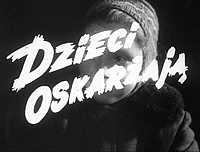 Dzieci oskarżają
Dzieci oskarżają
Poland, 1956, black and white, 10 mins
The second ‘black series’ (‘czarna seria’) film by Jerzy Hoffman and Edward Skórzewski seems to start in a more sedate fashion compared with the throat-grabbing immediacy of Look Out, Hooligans! (Uwaga chuligani!, 1955), in that it begins with a mother and daughter doing (Christmas?) shopping and admiring the attractively decked-out window displays. But before the first minute is up, the mother is lying dead in the street, a victim of a drink-driver who smashes into her without any warning. As in the earlier film, the title suddenly jumps onto the screen as though graffitied onto the celluloid, this time over the face of the traumatised girl.
But she’s not the only child who suffers. The trial scene that follows establishes that the driver also had two children, and when he’s locked up for ten years (on top of a lifetime driving ban), they become equally innocent victims of his drinking. While Look Out, Hooligans! looked at teenagers destroying themselves through their own (albeit naïve and misguided) lifestyle choices, The Children Accuse is far more disturbing in that its victims are unimpeachably innocent, yet end up psychologically and sometimes physically scarred for life.

After such a despairingly gloom-drenched opening, it’s hard to watch the successive montages of happy, smiling, laughing and playing children without worrying (usually justifiably) about what’s about to happen. A new baby is born, and the proud parents and their delighted friends and relatives celebrate – which naturally involves drinking alcohol. What’s wrong with that? Absolutely nothing at this stage, but when the child reaches the age of seven, his father compels him to join in and swig a shot of vodka. As he does so, the camera scrutinises his face in close-up, as it registers both his distaste and his tearful realisation of what it’s doing to his parents.
Soon afterwards, he’ll be running errands for them, collecting vodka from the nearby bar, the proprietress blithely ignoring the sign insisting that it be drunk on the premises. Unsupervised and open to temptation, is it any wonder he takes a surreptitious swig on his way home? And is it surprising that his eighteenth birthday should consist largely of teenagers like himself, lying slumped on the sofa and in the corner, smashed out of their brains? When the record starts skipping, no-one notices. And thus a new generation of alcoholics is created.
This story shows the effects of casual neglect over a long-term period, while the next episode depicts a single instance of selfishness, as Janicki accepts the offer of a drink with workmates instead of collecting his son. One drink inevitably becomes several, the child is forgotten entirely, crying quietly on his own as the school caretaker sweeps up in the distance. It’s not even clear if Janicki gets home alive, as the close-ups of the tram wheels intercut with his blind stumbling suggest otherwise.

Finally, we hear a child’s first-hand account as he narrates the experience of living with two alcoholic parents in a slum that barely passes for human habitation, having to rear his four younger siblings almost single-handed. As he goes out to buy vodka, there’s a return to the shop-window motif of the opening scene, only this time there’s no loving mother to indulge her child’s desires. Though they themselves don’t necessarily indulge, his siblings and countless other children like them have been irreparably damaged by their parents’ alcoholism – and the most disturbing montage is left until the end, as we see (presumably genuine) footage of severely traumatised children, the horrors of whose lives don’t bear thinking about.
Although clearly made by the directors of Look Out, Hooligans! (the films are twin souls in terms of their mise-en-scène, crepuscular lighting and emphatic editing), The Children Accuse is more sparing in its shock tactics yet blunter in its social criticism. As before, neglectful bar-owners and shop proprietors are just as culpable in the way they cynically turning a blind eye to what’s going on. The music score (sadly uncredited) is subtler than before, bordering on atonality at times in order to add an unsettlingly off-kilter feel to even the most outwardly unexceptional shots. Alcoholism is a subject that often crops up in Polish cinema (most recently in Marek Koterski’s 2006 feature We’re All Christs/Wszyscy jesteśmy Chrystusami), but its devastating effects have rarely been caught so powerfully as here. Back in 1956, its impact must have been tenfold.
- Director/script: Jerzy Hoffman, Edward Skórzewski
- Camera: Antoni Staśkiewicz
- Editing: Ludmiła Godziaswili
- Sound: Hamila Paszkowska
- Commentary: Karol Małcużyński
- Narration: Andrzej Łapicki
- Sound Editing: Stefan Zawarski
- Assistant Cameraman: Jan Wileński
- Production Manager: Andrzej Liwnicz
- Production Company: Wytwórnia Filmów Dokumentalnych (Documentary Film Studio)
The film is included on PWA’s Polish School of the Documentary: The Black Series double-DVD set (Region 0 PAL). As with Look Out, Hooligans!, the picture is dark and grainy, but it suits the subject to perfection. The subtitles are occasionally awkwardly worded, and the odd typo creeps in from time to time, but they seem to translate everything and are properly synchronised.